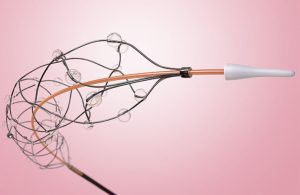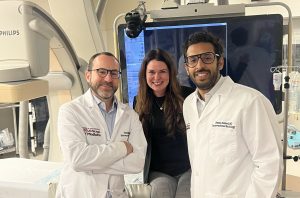Pulmonary emboli are life-threatening blood clots that can travel to the lungs and affect almost a million people in the United States per year. Flow Medical, co-founded by Dr. Jonathan Paul, an interventional cardiologist from the University of Chicago, is pioneering new approaches to treat the condition. Flow Medical’s innovative medical technology has the potential to improve the care and treatment of millions. However, Flow Medical’s journey from an innovative idea to a promising startup could not have been realized without the critical support of the I-Corps program and the dynamic entrepreneurial ecosystem at the University of Chicago.
The Beginnings of Flow Medical
Flow Medical’s journey began with a desire to improve the lives of patients suffering from blood clots that lead to high-risk pulmonary embolisms. With significant experience and expertise in the area, Dr. Paul, alongside his colleagues Dr. Osman Ahmed and Jennifer Fried, realized the shortcomings of current medical devices used to treat these conditions. The COVID-19 pandemic highlighted the urgent need for more effective and precise treatments, prompting the duo to brainstorm innovative solutions.
Their concept centered around treating pulmonary emboli using a drug called TPA (tissue plasminogen activator), delivered via catheters placed directly in the lungs of patients. The innovation came in the method of delivering this drug more directly and efficiently, and with real-time feedback on the resolution of the clot, thus pinpointing dosages for a more personalized treatment experience.

Flow Medical’s novel catheter enables targeted treatment for pulmonary embolism
Entrepreneurship Education with Polsky Center I-Corps
Despite their medical expertise, Dr. Paul and Dr. Ahmed were newcomers to the complexities of business development and startup creation. This is where the I-Corps program came into play, providing the structure and guidance necessary to transform their innovative idea into a viable company.
According to Dr. Paul, the I-Corps program was the essential first step that validated their ideas through a rigorous customer discovery process. Supported by the University of Chicago’s Polsky Center for Innovation, they were paired with MBA students from the Chicago Booth School of Business, which introduced them to a vast network of stakeholders. Through extensive interviews with physicians, medical device experts, and potential investors, they gathered invaluable insights that helped refine their innovative device.
Polsky Center I-Corps program was an incredible resource for us. The first advice that we got was that we needed to validate that our solution solves a problem, and something that people would actually use in the field. With the help of Booth MBA students, we conducted over 30 customer discovery interviews. Some of the feedback we received was surprising. We actually pivoted our solution to make it more user-friendly. -Dr. Paul
From I-Corps to Impact
Flow Medical’s journey did not end with I-Corps. The insights gained were just the foundation for the next stage: development and scaling. The team advanced through the Compass Deep Tech Accelerator at the Polsky Center, and later participated in the George Shultz Innovation Fund pitch competition. The team was awarded seed funding through this and via an NIH SBIR Phase 1 grant, which validated their progress and provided the resources necessary for initial product development.
Subsequently, they secured partnerships with engineering firms for product development and engaged with regulatory experts and the NIH to lay the groundwork for clinical trials. With the guidance of their newly appointed CEO, Jennifer Fried, the company raised over $6 million to propel their groundbreaking device toward clinical trials.

Flow Medical cofounders Jonathan Paul, Jennifer Fried, and Osman Ahmed.
A Vision for The Future
Flow Medical aims to revolutionize the treatment of pulmonary embolism. Over the next few years, the startup plans to complete FDA submissions and launch its first human clinical trial, striving to bring its innovative device to market.
Flow Medical’s journey from idea to startup is a testament to the power of innovation and strategic ecosystem support. I-Corps at the University of Chicago was instrumental in equipping Dr. Paul and his team with the skills, insights, and resources needed to navigate the complex journey of startup entrepreneurship.
With a focus on delivering impactful, personalized medical solutions, Flow Medical stands on the brink of transforming pulmonary embolism treatment; an inspiring example of how academic innovation can ripple through the broader healthcare ecosystem, changing lives and redefining possibilities.
Image Credit:
University of Chicago’s Polsky Center for Innovation
NSF I-Corps Hub: Great Lakes Region, 2025
Story by Christopher Eakin
